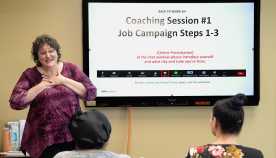About Us


Stanley v. City of Sanford, Florida, No. 23-997, 2024 WL 3089536 (June 24, 2024).
Decision below: 83 F.4th 1333 (11th Cir. 2023).
Oral argument is not yet scheduled.
Issue: Whether, under the Americans with Disabilities Act (ADA), a former employee—who was qualified to perform her job and earned post-employment benefits while employed—loses her right to sue over disability discrimination with respect to those benefits solely because she no longer holds her job.
The ADA prohibits disability discrimination against a “qualified individual” in employment. 42 U.S.C. § 12112(a). Discrimination often includes inequities in hiring or layoffs, but can also include inequities in access to fringe benefits, such as employee stock options or health insurance. Importantly, the ADA defines a “qualified individual” as someone who “can perform the essential functions of the employment position that such individual holds or desires.” 42 U.S.C. § 12111(8).
Karyn Stanley was a firefighter for the City of Sanford, Florida, for 15 years until Parkinson’s disease prevented her from continuing in the line of duty. Stanley v. City of Sanford, 83 F.4th 1333 (11th Cir. 2023). When she retired, Ms. Stanley believed she would keep the health insurance provided by the City until age 65, as that had been the City’s benefits policy when she was hired. Id. That would mean she could continue to receive employer health insurance until she was eligible for Medicare. However, without Ms. Stanley’s knowledge, the City changed its policy to limit the insurance subsidy to 24 months for employees who retired because of a disability. Id. Those who retire after 25 years—that is, those who do not retire because of a disability—remained eligible for the subsidy until age 65. Petition for Writ of Certiorari at 10, Stanley v. City of Sanford, 2024 WL 1098329 (No. 23-997). As a result, Ms. Stanley would have to make other arrangements for healthcare for 16 years until she became eligible for Medicare.
Ms. Stanley brought a discrimination claim under the ADA and other federal and state laws. Stanley, 83 F.4th at 1336. She argued that the City could not offer fewer benefits to people who retired because of a disability compared to those who retired for other reasons. Id. However, because the discriminatory act—the early end of the subsidy—happened after Ms. Stanley was no longer employed and, thus, not technically a “qualified individual,” the lower court found that Ms. Stanley had not stated a plausible discrimination claim under the ADA and dismissed the case. Id. at 1337.
Ms. Stanley appealed the decision. Affirming the lower court, the U.S. Court of Appeals for the Eleventh Circuit reasoned that the ADA’s definition of “qualified individual” means only current employees or applicants may bring claims. Id. at 1349, 1342-43. It thus held that the ADA claim failed. Id. at 1344.
The Eleventh Circuit joined three other federal circuits with this ruling: the Sixth, Seventh, and Ninth Circuits have also stopped former employees from suing for discrimination in post-employment benefits under the ADA. Id. at 1341. Two circuits, the Second and Third, have disagreed and allow former employees to bring discrimination suits under the ADA. Id.
Now, the Supreme Court will resolve the circuit split and decide whether former employees can bring discrimination claims under the ADA.
WHAT’S AT STAKE
Today, nearly 19 million seniors—a third of adults age 65 and older—have a disability. Many of these older adults, like Ms. Stanley, rely on retirement benefits to access necessary healthcare. In addition, more and more workers are taking disability retirement. The Social Security Administration predicts that more than one in four current 20-year-olds will become disabled before reaching retirement.
If the Supreme Court holds that former employees cannot bring discrimination claims for post-employment fringe benefits under the ADA, older adults who may become disabled in the future—and who do not realize that their employers have discriminatory benefits policies—will not have the opportunity to sue to protect their benefits.
Rebecca Rodgers, RRodgers@aarp.org
View the Full Supreme Court Preview

















